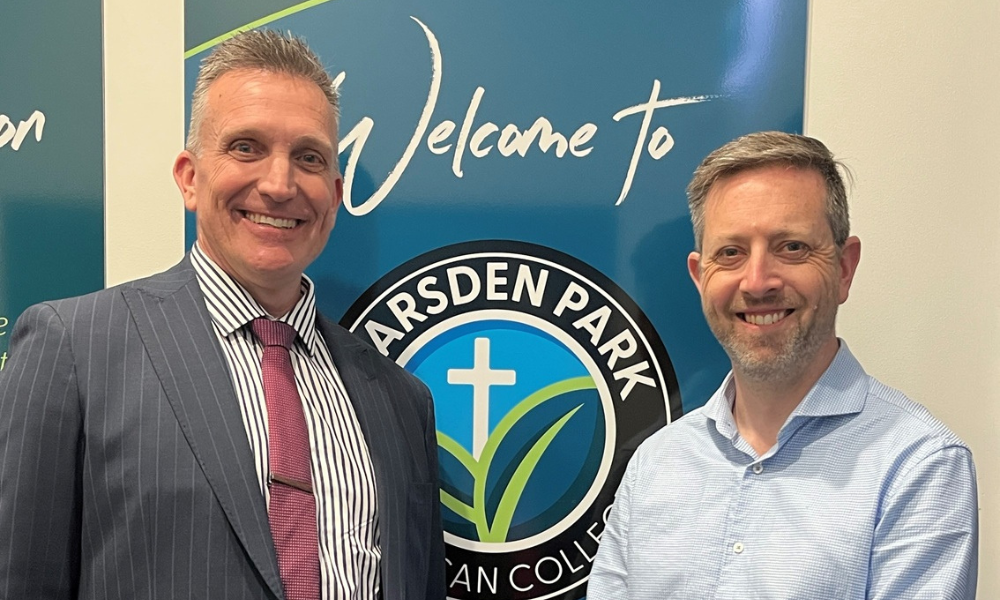
At Marsden Park Anglican College in Sydney’s Western suburbs, a quiet revolution is underway. Enrolments are surging, waitlists are swelling, and the school is gearing up to become a full Year 12 campus by 2029. But with growth comes a daunting challenge – standing out in an increasingly crowded education market.
Fortunately, the College has a Principal at the helm who understands exactly what it takes to achieve this.
With more than 30 years’ experience in education, Darren Cox is a visionary leader who not only built his school from scratch but has previously led the development of a small school of 180 students to one of the most sought-after schools in the Hunter region, now catering for nearly 1200 students.
In 2025, he is spearheading a bold new chapter for Marsden Park Anglican College, helping to craft a distinct identity that will carry it through its biggest transformation yet. Working alongside Cox in this exciting chapter for the College is Dylan Malloch, a parent and School Council member with a background in school marketing.
Below, The Educator speaks to Cox about the challenges of managing rapid growth, the art of shaping a school’s identity, and the power of visionary leadership in building culture from the ground up. In this interview, The Educator also speaks to Malloch about the untapped value of drawing on parents’ professional expertise beyond the usual volunteering roles.
TE: Marsden Park Anglican College is clearly growing fast! What do you see as the biggest challenges of managing rapid enrolment in such a crowded education market, and how are you making sure the College’s identity doesn’t get lost in the expansion?
At Marsden Park Anglican College, the pace of growth is extraordinary. We currently have over 750 students, with enrolments expected to pass 1,000 by 2026, and up to 1,800 within a few years. That means new staff, more facilities, and constant compliance checks every year. The challenge is growing quickly while staying strategic and maintaining culture. My experience in building schools has taught me to balance scale with clarity of vision. What makes MPAC unique is our Anglican identity, exceptional staff who go above and beyond, a sense of fun and a clear commitment to frameworks for teaching, learning, and wellbeing that keep our mission at the centre.
TE: Having built a school from the ground up, what do you think it takes to shape a school’s brand and culture that families in 2025 want to be part of?
Parents often tell us MPAC feels like a genuine community, where teachers know their children deeply and personally. That sense of belonging, coupled with strong academic results, great staff and a vibrant culture is a powerful drawcard. Our Anglican foundations give us confidence to balance tradition with innovation, because we believe every child is made in the image of God and deserves the best education possible. Having built schools before, you can’t think small. You need to start with an ambitious vision not just for amazing facilities and activities but a vision for every person’s life. I’m also naturally competitive, and I want MPAC to be a school families are proud to be part of.
TE: When you’re assembling a leadership team for a new school, what qualities do you look for, and how do you build a shared vision from day one?
In 2026 we’ll appoint three new heads of department, who’ll work alongside our recently appointed Heads of Junior and Senior School and Business Manager. As the College grows, so will our leadership team. Using a strengths-based approach to leadership, I am passionate about bringing out the best in people and giving them the opportunity to flourish in their role. I am not looking for people to maintain the status quo but rather drive our college forward through collaboration, confidence, competence, and creativity. A strong team culture is vital. Several staff have actually left more senior roles elsewhere to join us because they’ve been drawn to our vision. That’s powerful. At MPAC, culture isn’t imposed, staff help shape it. That sense of ownership builds advocacy, loyalty, and the kind of shared vision you need for lasting success.
TE: Dylan, as both a parent and School Council member with a background in marketing, what do you see as the “untapped” value in schools drawing on parents’ professional expertise beyond the usual volunteering roles?
Too often schools underuse the professional expertise of their parents. It’s not about using everyone, but about doing due diligence, defining clear terms, and drawing on skills where they add genuine strategic value. What I learned in my almost-decade as Director of Marketing at St Paul’s School in Brisbane was to build strategies drawing on corporate best practice, not just education convention, because strategic marketing helps shape a School’s identity. What I love about MPAC is that Darren is the one of the best marketing assets a school could hope for: a leader who is charismatic, visionary, and able to articulate identity in a way that parents and staff want to rally behind. I’m enjoying bringing my experience into the governance conversation while also partnering with a Principal who instinctively understands brand and culture.

